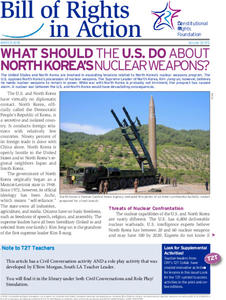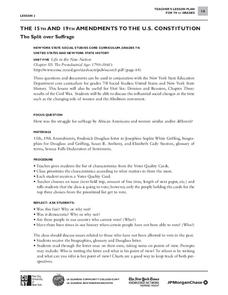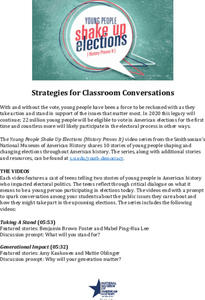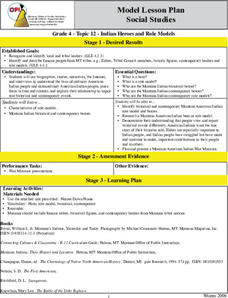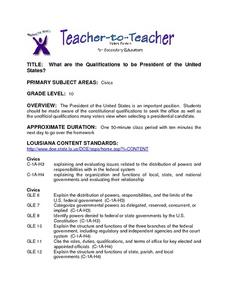Constitutional Rights Foundation
What Should the US Do About North Korea's Nuclear Weapons?
North Korea, a shadowy nation distrustful of America, is working on a nuclear weapons program. What should the United States do? The question has plagued American presidents for years, but now young scholars get to make their...
Curated OER
United Nations Lesson Plans
United Nations lesson plans can help students learn about an organization whose mission is to promote peace and security.
Advocates for Human Rights
Refugees and Asylum Seekers
To gain a deeper understanding of the plight of refugees and asylum seekers, class members read stories written from the point of view of an emigrant, map the individual's journey, and note the human rights affected by each stage of the...
Advocates for Human Rights
U.S. Immigration Policy
The United States Immigration Policy is incredibly complex. To gain a deeper understanding of the criteria, quotas, preferences, and categories of immigrants admitted to the US, class members engage in a role playing activity that...
Constitutional Rights Foundation
Educating About Immigration The DREAM Act
Group members role play state legislators, supporters of and opponents to the The DREAM Act (Development, Relief, and Education for Alien Minors). After listening to the arguments put forth for and against the immigration legislation,...
City University of New York
The 15th and 19th Amendments to the U.S. Constitution
Who gets to vote? Learn more about struggles for suffrage throughout United States history with a lesson plan based on primary source documents. Middle schoolers debate the importance of women's suffrage and African American suffrage...
Smithsonian Institution
Young People Shake Up Elections (History Proves It) Educator Guide
Vote, it's your civic duty! The resource provides several videos about voting in the United States. Scholars watch a series of topics ranging from youth participation to civic action. The educator's guide provides teachers with...
National Endowment for the Humanities
James Madison: Raising an Army—Balancing the States and the Federal Government
To war! To war! Every nation in the history of the world has had to deal with warfare on some level. Scholars go through a series of activities and discussions surrounding the development of the Constitution to help them better...
Curated OER
How Has the Constitution Shaped the Economic System in the United States?
Students examine the characteristics of market economies. In this United States economics instructional activity, students analyze the Constitution to understand how it contributes to the market economy established in the United States....
Curated OER
The National Motto
Second graders examine the meaning of the national motto, "In God We Trust." In this national motto lesson, 2nd graders explain some of the reasons why people selected the motto for the nation after viewing and discussing a coins and a...
Curated OER
Indian Heroes And Role Models
Fourth graders investigate the concept of heroes and role models within the Native American community. They use primary and secondary resources to answer specific questions intended to bring the students to a definition of Native...
Curated OER
What are the Qualifications to be President of the United States?
High schoolers research the qualifications necessary to be the president of the United States. They create a want-ad for this position using what they have learned about the qualifications.
Curated OER
Nation Building
Ninth graders examine the role of the United States in nation building. In this World History activity, 9th graders evaluate the role of the United States in building nations in other parts of the world.
Curated OER
200 Greatest Pop Culture Icons
Upper graders explore pop culture and pop music as a forum for female role models. They explore women who have currently contributed to our pop world and why they could be considered role models. They each interview a woman in their...
Curated OER
Japan and Disputed Land
Young scholars engage in a variety of activities to research the land disputes that Japan has had in the 20th century with its neighbors. They role play an interesting meeting with the United Nations and conduct research to answer...
Curated OER
How Can You Be a Revolutionary?
Tenth graders identify priorities in human rights for children. They discuss the role the United Nations has in bringing nations together to work for peace and development. They create a list of imperatives that would address oversights...
Curated OER
The Roots of Prohibition: Examining the Effort to Prohibit Alcohol in America
Five segements from Ken Burns' documentary series Prohibition, easily accessed on the PBS website, are at the center of a terrific short unit on the roots of America's ambivalent relationship with alcohol. Engage your secondary class...
Curated OER
Oil Crisis: What Would You Do?
The dynamics between the economies and politics of the United States and the Middle East are here to study. Upper graders read and discuss scenarios relating to OPEC and the current oil crisis, then in small groups role-play members of...
Constitutional Rights Foundation
U.S. Immigration Policy and Hitler’s Holocaust
Though the Statue of Liberty welcomes political refugees to her shores, the welcoming sentiment has not always been reflected in the American citizenry. High schoolers read about the regrettable period in United States history when the...
City University of New York
The Split Over Suffrage
Compare and contrast Frederick Douglass's and the National Women's Suffrage Association's stances on equal rights and suffrage with a series of documents and worksheets. Learners work together or independently to complete the packet, and...
Smithsonian Institution
New American Roles
America has dealt with its fair share of hardships in contemporary history. The resource discusses the events of the Gulf War, September 11th, the Afghanistan War, and The Iraq War. Scholars click on artifacts to learn more information,...
National Endowment for the Humanities
How to Win a World War
High schoolers are have begun to learn the art of diplomacy with each other, but do they understand how diplomacy works at a global level? The second in a series of four lessons, guides scholars in evaluating primary sources. The why...
National Endowment for the Humanities
Empire Intelligence Briefings
To trade or not to trade. Young diplomats put their country's best foot forward in a series of briefings for other countries about their nations. The goal is to persuade others to engage in diplomacy and trade. Using a previous lesson...
Curated OER
National Expansion
Students investigate the Manifest Denstiny. They explore how the idea was evident in 19th century American maps. Students brainstorm the relationships between maps and national expansion. They review a map from 1816 that called for...


